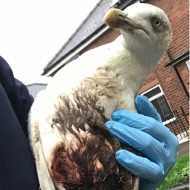
Charity issues reminder on dangers of fishing litter for wildlife
The RSPCA are urging those who enjoy fishing to ensure they dispose of their waste tackle and line carefully, after a seagull was found in a garden with both feet severed by fishing litter.
RSPCA inspector Claire Little responded to the call about the injured bird, which was trapped in a residential garden on Friday 20 November.
“The homeowner had spotted the bird trapped in her garden and was concerned about his welfare,” said Ms Little, “She said he was collapsed, couldn’t stand up and couldn’t fly. She could also see blood coming from his legs and said she thought his feet were missing.
“He couldn’t get out of the garden so I was able to catch him quite easily, which is never a good sign. As soon as I had hold of him it became clear what the problem was; he was missing both feet.
“They’d been severed off and he still had a small bit of fishing line twisted around the stubs, embedded very deeply in the skin.”
It was clear the bird couldn't survive in the wild and so the RSPCA were left with no choice but to euthanise the animal.
The charity – which receives around 3,000 calls each year about animals affected by angling litter – is urging fishermen to help prevent future casualties by following the Angling Trust’s Take 5 campaign and making use of the Anglers National Line Recycling Scheme to dispose of their waste tackle and line.
Image (c) RSPCA.



 The RCVS has announced a new version of its 1CPD mobile app, with enhanced features for veterinary surgeons and veterinary nurses to record their continuing professional development.
The RCVS has announced a new version of its 1CPD mobile app, with enhanced features for veterinary surgeons and veterinary nurses to record their continuing professional development.